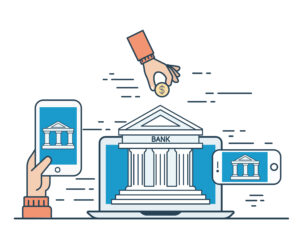As the digital currency continues to gain popularity, traditional banking systems are facing increasing competition from decentralized financial networks. Digital currencies, such as Bitcoin and Ethereum, offer a range of benefits. These advantages are leading many to question the relevance of traditional banking systems in a digital age. While the technology behind digital currencies is still in its early stages, its potential to disrupt banks is significant. In this article, we will explore how digital currency is challenging traditional banking systems and the potential implications for the future of finance.
WHAT ARE DIGITAL CURRENCIES POTENTIAL IMPACTS ON TRADITIONAL BANKING?

- Lower transaction costs– Cryptocurrencies are significantly reducing banking fees by offering lower transaction costs. This is due to the absence of personnel, facilities, and other overheads that banks typically have, resulting in crypto fees being very small. As an outcome, paying with digital money has become a far more cost-effective option. This could result in reduced profits and a decline in the number of bank branches and employees.
- Decentralized system over centralized– One advantage of cryptocurrencies over traditional banking systems is decentralization. Decentralized systems offer increased security and privacy for users, as transactions are recorded on a public ledger that is resistant to tampering and hacking attempts. In contrast, centralized banking systems are vulnerable to security breaches and data leaks. Additionally, decentralized systems offer users greater control over their personal information and financial data. Transactions can be completed anonymously without the need for intermediaries such as banks or payment processors. The decentralized nature of digital currencies has the potential to disrupt traditional banking systems and offer users greater security, privacy, and control over their financial transactions.
- Transactions 24/7– Faster transaction processing is a key advantage of cryptocurrencies, which can be transferred between parties almost instantly. In contrast, traditional banking systems can take days to process international transactions. Additionally, cryptocurrencies allow for 24/7 transaction processing, meaning that transfers can be completed at any time of day, whereas traditional banks typically have limited operating hours. As more people become aware of the benefits of digital currencies, there may be a shift towards using them. This could lead to increased competition in the financial services sector and the development of new, innovative solutions that meet the needs of consumers in a rapidly changing digital world.

- No need for physical currency– Cryptocurrencies offer a benefit over traditional banking systems in terms of not requiring physical currency. The production, distribution, and security of physical currency can be costly and vulnerable to theft and counterfeiting. In contrast, cryptocurrencies are purely digital and operate through decentralized networks, eliminating the need for physical currency and making transactions more convenient and cost-effective for users. As more individuals and businesses turn to digital currencies, traditional banking systems may need to adapt to remain competitive in the evolving financial landscape.
- Accessibility– Crypto offers greater accessibility. Unlike traditional banking, digital currencies can be used by anyone with an internet connection. Right now, 4.95 billion people have internet access. This is 65.6 percent of the entire world’s population. It makes digital currencies particularly useful for people who do not have access to traditional banking services or live in areas where banking infrastructure is limited. Furthermore, cryptocurrencies allow for transactions to be made without the need for a bank account, which is beneficial for individuals who are not eligible for traditional banking services or cannot afford them. Overall, the accessibility of cryptocurrencies makes them a more inclusive and accessible form of finance. As a result, digital currencies may become more engaging to consumers who are not able to access them.
The potential impacts of digital currencies on traditional banking are significant and could lead to significant changes in the banking industry. Banks could potentially face reduced revenues and have to invest in new technologies and infrastructure to keep up with digital currencies. It will be interesting to see how traditional banking systems adapt and evolve to remain relevant in a rapidly changing financial landscape.
